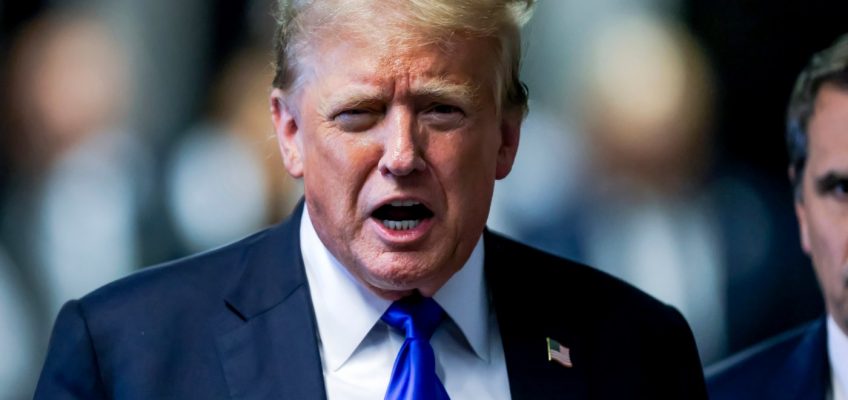A half-century ago this August, a career congressman named Gerald Ford took the presidential oath in the White House East Room, proclaiming, “Our long national nightmare is over. Our Constitution works. Our republic is a government of laws, not of men.”
Ford was able to preside over an unexpectedly smooth transfer of power, marking the end of the two-year Watergate scandal, in large part because his disgraced predecessor, Richard Nixon, respected the institutions of government that produced his downfall and tearfully accepted their verdict.
But the transition was far more fraught with peril when Joe Biden, another career lawmaker, took his presidential oath in 2021 amid an even greater test of the nation’s constitutional underpinnings and, in language akin to Ford’s, declared, “America has been tested anew and America has risen to the challenge.”
In fact, that challenge to American democracy remains ongoing because Donald Trump, unlike Nixon, has refused to this day to respect the constitutional procedures – a free and open election — that ended his presidency.
Instead, he has spent more than three years inaccurately and dishonestly persuading millions of supporters and intimidating timid GOP leaders to believe Biden’s victory was somehow tainted. Even more unfortunately, he is seeking a return to power – and may get it – on a platform of vengeance against all who counted him out or launched the proceedings that led to 88 state and federal felony indictments against him.
Those two contrasting examples came to mind when Trump, not for the first time, made clear how much he disrespects our nation’s legal processes in condemning the 34 felony convictions in his New York hush money trial, the district attorney who brought the charges and the judge who presided over the proceedings.
“These are bad people,” the former president said in what was billed as a press conference but turned into a typical Trump rant. Judge Juan Merchan, he said, “looks like an angel, but he’s really a devil.”
He concluded, again inaccurately, “This is all done by Biden and his people,” falsely blaming the president and Justice Department for a prosecution that, in fact, was brought by the elected district attorney of New York County.
And using words that were far truer than he might have realized, Trump said, “This is a case where if they can do this to me, they can do this to anyone.” He had it backward. As Biden put it later that day in his first comments on the verdict: “The American principle that no one is above the law was reaffirmed.”
In recent years, many people have asked me, as a journalist who covered the Senate during the Watergate era, to compare the two presidents whose flouting of the proprietaries and the laws caught up with them, Nixon via the impeachment process and Trump through the criminal process.
Their cases are, of course, not precisely parallel. The institutions of government rendered a final judgment on Nixon, which made it impossible for him to remain as president. The nation’s voters rendered one judgment on Trump’s presidency and one of its judicial institutions another, both of which he might still be able to politically and legally reverse.
But it is hard to imagine Trump ever saying anything like the words Nixon used nearly 50 years ago when he bowed to the inevitable and resigned, noting he no longer had the votes to prevent impeachment in the House and conviction in the Senate.
In his official farewell speech to the nation, he said he was acting to hasten “the start of that process of healing which is so desperately needed in America,” declaring that “if some of my judgments were wrong, and some were wrong, they were made in what I believed at the time to be the best interest of the Nation.”
Then, in a second, more personal speech the next morning, a tearful White House farewell to friends, supporters, staffers and family members, he blamed himself. “Always remember, others may hate you, but those who hate you don’t win unless you hate them, and then you destroy yourself.” Nixon said.
That is a lesson Trump has not yet fully learned, that much of what he rails against was brought on not by his enemies but by his own ego and his disrespect of the nation’s laws and political proprieties – and that his means of dealing with it may not achieve the result he claims to seek.
Indeed, as the contrast between Trump’s reaction to his conviction and Nixon’s reaction to his forced resignation makes clear, Trump has shown by word and deed that he disrespects the legal and the constitutional process — if he truly understands it. Nixon, even while resisting and fighting it, showed ultimately he respected it.
That is why the Nixon-Ford transition went so smoothly and the Trump-Biden one didn’t. And it is why the forthcoming election could result in an even greater threat to our democratic processes should Trump again be defeated and, as he has already suggested, again challenge the result.
Ironically, the fact that he seems likely to spend the next five months railing against his conviction, the courts, the Biden presidency and the unfairness of it is all — instead of offering a positive vision for the years ahead — may ultimately prove decisive in determining that result.
Carl P. Leubsdorf is the former Washington bureau chief of the Dallas Morning News. His email address is carl.p.leubsdorf@gmail.com
Related Articles
Lisa Jarvis: Boys need the HPV cancer vaccine as much as girls
David French: Civil liberties make for strange bedfellows
Hal Brands: Putin’s shadow war against Europe is intensifying
Andreas Kluth: The U.S. can’t be protectionist and world leader
Mary C. White: Most older Americans who need hearing aids don’t use them. Here’s how to change that


Leave a Reply